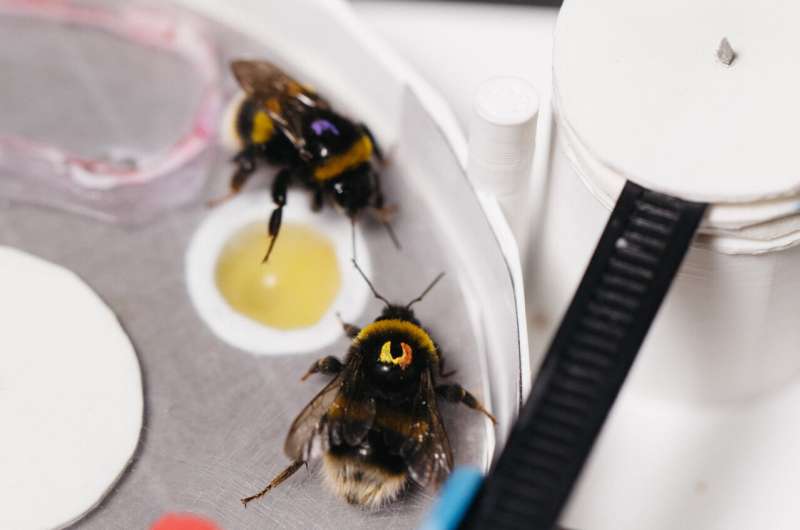This article has been reviewed according to Science X's editorial process and policies. Editors have highlighted the following attributes while ensuring the content's credibility:
fact-checked
peer-reviewed publication
trusted source
proofread
Bumblebees surprise scientists with advanced social learning skills

In a groundbreaking discovery, bumblebees have been shown to possess a previously unseen level of cognitive sophistication. A new study, published in Nature, reveals that these fuzzy pollinators can learn complex, multi-step tasks through social interaction, even if they cannot figure them out on their own. This challenges the long-held belief that such advanced social learning is unique to humans, and even hints at the presence of key elements of cumulative culture in these insects.
Led by Dr. Alice Bridges and Professor Lars Chittka , the research team designed a two-step puzzle box requiring bumblebees to perform two distinct actions in sequence to access a sweet reward at the end. Training bees to do this was no easy task, and bees had to be helped along by the addition of an extra reward along the way. This temporary reward was eventually taken away, and bees subsequently had to open the whole box before getting their treat.
Surprisingly, while individual bees struggled to solve the puzzle when starting from scratch, those allowed to observe a trained "demonstrator" bee readily learned the entire sequence—even the first step—while only getting a reward at the end.
This study demonstrates that bumblebees possess a level of social learning previously thought to be exclusive to humans. They can share and acquire behaviors that are beyond their individual cognitive capabilities: an ability thought to underpin the expansive, complex nature of human culture, and one previously thought to be exclusive to us.
Dr. Bridges says, "This is an extremely difficult task for bees. They had to learn two steps to get the reward, with the first behavior in the sequence being unrewarded. We initially needed to train demonstrator bees with a temporary reward included there, highlighting the complexity."
"Yet, other bees learned the whole sequence from social observation of these trained bees, even without ever experiencing the first step's reward. But when we let other bees attempt to open the box without a trained bee to demonstrate the solution, they didn't manage to open any at all."
Beyond individual learning, this research opens exciting possibilities for understanding the emergence of cumulative culture in the animal kingdom. Cumulative culture refers to the gradual accumulation of knowledge and skills over generations, allowing for increasingly complex behaviors to develop. The bees' ability to learn such a complex task from a demonstrator suggests a potential pathway for cultural transmission and innovation beyond their individual learning capabilities.
Professor Chittka adds, "This challenges the traditional view that only humans can socially learn complex behavior beyond individual learning. It raises the fascinating possibility that many of the most remarkable accomplishments of the social insects, like the nesting architectures of bees and wasps or the agricultural habits of aphid- and fungus-farming ants, may have initially spread by copying of clever innovators, before they eventually became part of the species-specific behavior repertoires."
This research opens new avenues for understanding animal intelligence and the evolution of social learning. It challenges longstanding assumptions and paves the way for further exploration of the cognitive wonders hidden within the insect world, even hinting at the exciting possibility of cumulative culture among seemingly simple creatures.
More information: Alice Bridges, Bumblebees socially learn behaviour too complex to innovate alone, Nature (2024). DOI: 10.1038/s41586-024-07126-4. www.nature.com/articles/s41586-024-07126-4
Journal information: Nature
Provided by Queen Mary, University of London


















